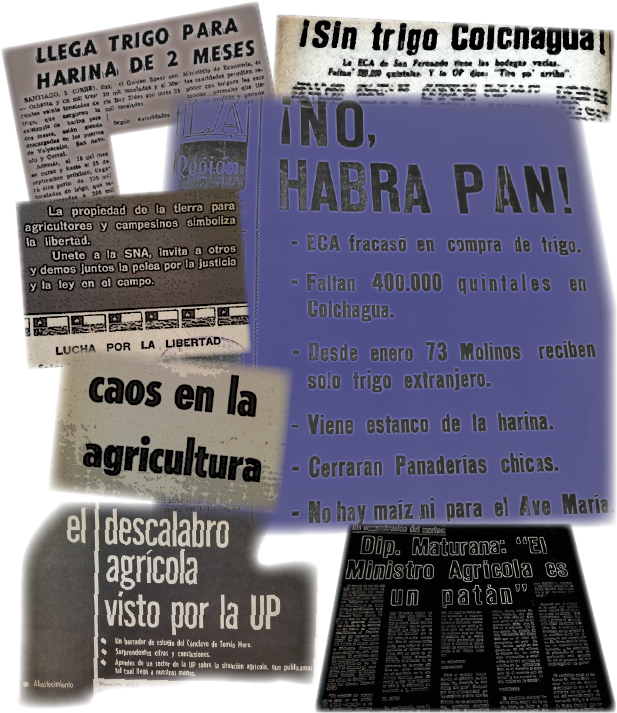
Propósito |
|
|
|
This project seeks to reconstruct and explain the development of the social and political conflict in Central Chile’s rural society under the Popular Unity government, by analyzing and interpreting the political and institutional response of large landowners and their main organization, the Sociedad Nacional de Agricultura (SNA), to the “Chilean road to socialism.” We will examine how the SNA and large landowners responded to three dimensions that the “Chilean road to socialism” assumed in rural society: a) the intensification of radical social mobilization related to the agrarian reform and the resulting acceleration of expropriations of landed estates by the Popular Unity government; b) the reorientation of the agrarian reform with the creation of “transitional” forms of organization (Centros de Reforma Agraria or CERAs and Centros de Producción, CEPROs), by which the Popular Unity government sought to further the transition to socialism; and c) the “estanco del trigo”, the economic policy aimed at controlling the market for critical agricultural products, which the Popular Unity implemented in January 1973 to counteract food scarcity and the growth of the black market. The project combines two approaches. On the one hand, from an institutional perspective, we examine the SNA’s discourse, political practices, and mobilization against the Popular Unity in the national political conflict. On the other hand, adopting a micro-social approach, the research examines the strategies and practices that sectors of politically active large landowners employed at the local level to confront the “Chilean road to socialism,” focusing on the rise of radical social mobilization and the acceleration of expropriations, the “socialist” reorientation of the agrarian reform with CERAs and CEPROs, and the “estanco del trigo”. In order to do so, the project will focus on three provinces that were representative of Central Chile’s rural society, and experienced intense political conflict arising from the implementation of the Popular Unity’s “Chilean Road to socialism” in the countryside: Colchagua, Linares, and Ñuble. |
 |
Equipo
| Investigador Responsable | |
| Claudio Robles Ortíz Departamento de Economía, Universidad de Santiago de Chile, (Ph.D., History, University of California, Davis) |
|
| Co-investigadores | |
| Joaquín Fernández Escuela de Historia, Universidad Finis Terrae, (Ph.D. candidate, Leiden University) |
Marcelo Casals Escuela de Historia, Universidad Finis Terrae, (Ph.D., History, University of Wisconsin, Madison) |
| Académica visitante | |
| Anna Cant Department of International History, London School of Economics (Ph.D., History, Cambridge University) |
|
| Tesistas | |
| Gamaliel Plagges, Magister en Historia Económica, Universidad de Santiago de Chile (2023) Tesis: “Agricultura y política económica. La respuesta de los agricultores de la provincia de Ñuble a la creación de los CERA” |
Bárbara Moya, Magister en Historia Económica, Universidad de Santiago de Chile (2024) Tesis: “El desempeño del sector agropecuario durante la implementación de la reforma agraria” |
| Lucas Contreras, Magister en Historia Económica, Universidad de Santiago de Chile (2023 y 2024) Tesis: “Los grandes terratenientes de Linares frente a la reforma agraria de la Unidad Popular” |
|
| Personal Técnico | |
| Margarita Goldflam (2022) | Diego Romero (2022) |
| Bárbara Moya (2022) | Dany Jerez (2023 y 2024) |
| Carlos Sottorff (2023 y 2024) | Bibiana Rendón (2024) |






